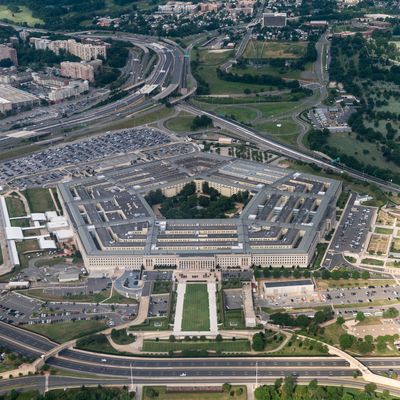
President Biden ordered a series of air strikes in Syria and Iraq early Monday morning, which the Pentagon says targeted weapons-storage facilities belonging to Iran-backed militias.
“The targets were selected because these facilities are utilized by Iran-backed militias that are engaged in unmanned aerial vehicle (UAV) attacks against U.S. personnel and facilities in Iraq,” the Pentagon said in a statement. The targets were all apparently in the border region, two in Syria and one in Iraq. The Pentagon claimed that “several Iran-backed militia groups, including Kata’ib Hezbollah (KH) and Kata’ib Sayyid al-Shuhada (KSS), used these facilities.”
It is the second time this year that Biden has ordered strikes against Iran-backed militias. In late February, the U.S. targeted what the Pentagon called a “border-control point” in Syria, which it said was being used by the same militias. That followed a mid-February rocket attack on U.S. forces in Iraq that killed an American contractor and injured a U.S. service member.
Pentagon press secretary John Kirby said Sunday that Biden “has been clear that he will act to protect U.S. personnel,” and ordered the strikes to “disrupt and deter” the militias’ drone attacks — claiming that the U.S. was acting in self-defense, within its legal rights. The Pentagon claimed, like it did in February, that the strikes were designed to minimize the risk of escalation, while sending a “clear and unambiguous” message.
Department of Defense officials who spoke with ABC News on Sunday night said that the “precision” air strikes were conducted by U.S. Air Force fighter planes; that the targeted facilities had command, control, and logistics capabilities; and that it was too early to know if any militia members or civilians were killed in the attacks. They said that five “one-way” drone attacks had been carried out against U.S and coalition forces in Iraq since April, in addition to rocket attacks — none of which killed any U.S. or coalition personnel.
The Biden administration has been attempting to resurrect a nuclear deal with Iran after President Trump abandoned the landmark deal the U.S. and several allies had negotiated with Iran during the Obama administration. In addition to the complications of a small, apparent proxy war with Iran in Iraq and Syria, the Biden administration will also have to deal with a new hard-line president in Iran come August, though Iran’s supreme leader, Ali Khamenei, still apparently supports the reopened negotiations.






























